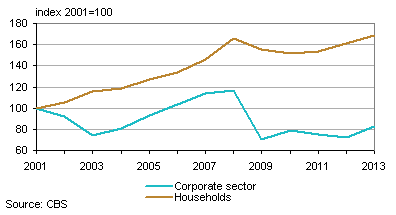Share corporate sector in national income up, share households down

A survey conducted by Statistics Netherlands shows that the share contributed to the national income by the corporate sector has increased over the period 2001-2013, but the share of households has decreased over the same period. Taxes partly account for this development: households paid higher taxes, the corporate sector paid less.
Disposable income corporate sector rose much more rapidly
The national income comprises all earnings of households and the corporate sector after deduction of taxes, subsidies and benefits. In the past four years, approximately 55 percent of the total disposable income went to households and just over 11 percent to the corporate sector. The corresponding figures for 2001 were 63 and 5 percent respectively. The proportions have shifted because the disposable incomes of the corporate sector have risen much more rapidly. They doubled during the period 2001-2013, whereas households saw their disposable incomes grow by 18 percent. Last year, corporate sector incomes diminished marginally, as a result of reduced profits generated by foreign subsidiaries.
Disposable income by sector

Households pay more tax, corporate sector pays less
One of the main reasons for the income shift from households to the corporate sector consists of payments made to the government. The so-called income transfers made by households have risen steeply during the entire period. Total wages earned by households increased, so they paid more income tax. Other factors that play a part in this respect are higher tax rates and the introduction of the new health care system in 2006. The introduction of the new health care system had an upward effect on the taxable income.
Reversely, households also receive money from the government, e. g. benefits. Although revenues increased after 2001, they rose less rapidly than payments to the government. On balance, households accounted for 83 percent of all transfers to the government, versus 70 percent in 2001. The government also makes transfers to households which are not considered to be income transfers, i.e. social benefits in kind for education, (health) care and social security. These expenses have nearly doubled since 2001 to 113 billion euros in 2013.
Unlike for households, the tax burden for the corporate sector was reduced in recent years. Income tax, for example, decreased from 13.7 billion euros in 2001 to 9.9 billion euros in 2013. The reduction was partly caused by a downward adjustment of company tax rates. On balance, the corporate sector paid 13 percent of all transfers to the government, versus 23 percent in 2001.
Payments to the government minus receipts

Frank Notten